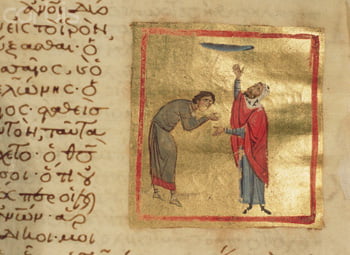Chapter Talk – 30th Sunday of the Year – October 23, 2022, cycle-C
In the gospel of today Jesus tells the story of two men who went up to the temple to pray, one a Pharisee, the upholder of the law, and the other a tax collector (Lk 18:9-14). The prayer of one is received by God, the other is not. One goes inward and puts his glance on himself, on his own conversion; the other looks at his neighbor, he does not go inward. He looks at his neighbor only to compare his life with that of the tax collector…He, the Pharisee, compares and builds himself up…Humility is standing on the truth of ourselves. One is humble, he truly prays; the other is not humble, his is not prayer and Jesus in a stark, direct manner points this out.
What can we learn from this? When we pray, which way are we leaning? Is our gaze, the inner eye of the soul, upon my sister or is it upon myself? In returning to our retreat with Fr. Isaac, I was re-reading Sermon 1 on the Song of Songs. Right at the beginning of the Sermon Bernard notes the “enemies of the soul”: “a misguided love of the world and an excessive love of self” (#2, p.2). Perhaps this is what we see in the attitude of the Pharisee. His ‘excessive love of self’ as he compares himself with his brother-tax collector and puffs himself up by listing the good things he has done. But what about the state of his heart and his demeaning attitude towards his brother? His way to compassion and mercy towards his brother is first to turn inward, to do an honest and true examen of himself.
Pope Francis in his ‘Catechesis on Discernment and Self-knowledge’ wrote: “Knowing oneself …is laborious: it implies patient soul-searching. It requires the capacity to stop, to ‘deactivate the autopilot’, to acquire awareness of our way of acting, of the feelings that dwell within us, of the recurrent thoughts that condition us and often unconsciously.” Let me repeat some poignant phrases: self-knowledge asks, ‘patient soul-searching’, the ‘capacity to stop’, to stop the ‘autopilot’ first reactions; it asks growing awareness of how we act daily and especially awareness of the thoughts that condition us, condition our way of being or reacting…and this often unconsciously. The one tool and antidote that Pope Francis recommends that can aid us is a nightly ‘examination of conscience’. This is not a conscience examen like we do before going to confession. We review the daily interactions that we had. In Pope Francis’ words: “The examination of conscience helps us a great deal, because in this way we see that our heart is not a road where everything passes without us knowing about it. No. to see: what passed by today? What happened? What made me react? What made me sad? What made me joyful? What was bad, and did I harm others?” Such inner work prepares us for prayer, a prayer that is humble…because it helps us stand on the truth of ourselves in the present moment. “Prayer and self-knowledge enable us to grow in freedom” says the Pope. And both together enable a true, God-informed discernment.
So: two men went up to the temple to pray…only one prayed…only one looked within his heart, only one was growing in self-awareness and the knowledge that this examen brought. Only one felt renewed, graced by the ever opening of the heart in truth. For prayer to be heard, we need to open the heart in truth before God. Such inward opening will always grace us with what we need in the moment, of insight, of clarity, of wisdom, of hope, indeed of faith.
Sr. Kathy DeVico, Abbes


